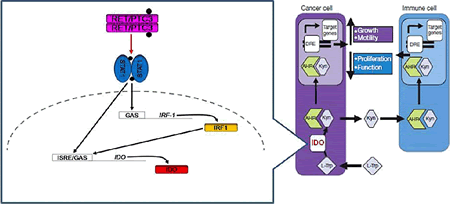ICEECE2012 Poster Presentations Thyroid cancer (108 abstracts)
Indoleamine 2,3-dioxygenase 1 (IDO1) and thyroid carcinoma: Ret/PTC appears as a strong genetic determinant for IDO1 expression
E. Menicali 1 , S. Moretti 1 , P. Voce 1 , R. Melillo 2 , M. Sponziello 3 , S. Filetti 3 , N. Avenia 1 , M. Santoro 2 & E. Puxeddu 1
University of Rome ‘Sapienza’, Rome, Italy.
Indoleamine 2,3-dioxygenase 1 (IDO1) is a single chain oxidoreductase that catalyzes tryptophan degradation to kynurenine. In cancer, it appears to exert an immunosuppressive function as part of an acquired mechanism of immune escape. In view of this notion, IDO1 has started to be considered a novel target in cancer therapy. Objective of this study was to evaluate IDO1 expression in papillary thyroid carcinoma (PTC) and to correlate its expression with genetic determinants of thyroid carcinogenesis. IDO1 expression was evaluated by QPCR in 105 PTCs and by immunohistochemistry in a subgroup of 55. IDO1 expression was also analyzed in 5 human thyroid carcinoma-derived cell lines and in PCCL3 cells characterized either by the doxycycline-inducible or stable expression of BRAFV600E and ret/PTC3. IDO1 expression resulted significantly higher in PTC than in normal thyroid. In basal growing conditions, IDO1 was overexpressed in FTC133 and B-cpap cells, but after stimulation with γ-interferon, all analyzed cell lines (including also TPC-1, 8505c and C643) showed up-regulation of the enzyme. Correlation of IDO1 expression with genetic background in PTC demonstrated a close to statistical significant association between higher IDO1 mRNA expression and BRAFWT status, which was lost at immunohistochemistry. However, while BRAFV600E-expressing PCCL3 cells did not show IDO1 overexpression, ret/PTC3-expressing ones demonstrated an increase of the enzyme. Ret/PTC3-induced activation of STAT1-IRF1 pathway appeared as the signaling cascade involved in IDO1 overexpression in the studied cell line. This study shows for the first time that papillary thyroid carcinoma overexpresses the immunomodulating protein IDO1 and that this event is correlated either to genetic determinants as ret/PTC or to the responsiveness of genetic programs to stimuli coming from the tumor microenvironment. Because the metabolite of IDO1 enzymatic reaction, kynurenine, has been shown to promote tumor cell growth and motility and to inhibit immune cell proliferation and function, these data put forward the possible importance of testing novel targeted therapies against IDO1 for the treatment of papillary thyroid carcinoma.
Declaration of interest: The authors declare that there is no conflict of interest that could be perceived as prejudicing the impartiality of the research project.
Funding: This work was supported, however funding details unavailable.

 }
}



